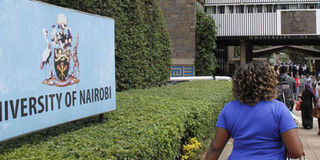University of Nairobi unveils postgraduate tracking system

The University of Nairobi which has launched a postgraduate tracking system. FILE PHOTO | NATION MEDIA GROUP
What you need to know:
- Prof Mbithi said the university produced 154 PhDs graduates last year, the highest in the history of the institution.
- Graduate School Director Prof Lydia Njenga warned that the university will not condone students who take long to complete their studies after their course work.
The University of Nairobi has launched an online system to monitor progress of postgraduate students in order to boost completion rates of their programmes.
Vice-Chancellor Peter Mbithi said the postgraduate tracking system (PGTS) is aimed at raising the number of students completing their doctorate degrees to 500 per year.
This year, Prof Mbithi said, the system is expected to help 200 students to complete their work.
COMPLETION RATES
Last year, Prof Mbithi disclosed that the university produced 154 PhDs graduates, the highest in the history of the institution.
Addressing senior administrators of the university involved in postgraduate supervision, Prof Mbithi said the aim is to boost postgraduate completion rates from the current 56 per cent to more than 60 per cent.
“The postgraduate tracking system is aimed at automating the supervision process for ease of management and follow-up of individual student progress at the research stage,” he said.
Prof Mbithi said all units must adopt the use of the system to enhance efficiency in the supervision process, progress and tracking the completion rate.
“Each Dean or Director will be required to ensure that their respective units fully adopt this system without further delay,” he said.
Prof Mbithi said the University has fully implemented the CUE requirement to have all PhD students publish at least two publications from their research work before completion of their studies.
“To support this noble requirement, I urge all Units to persuade students and staff to publish the articles in high impact Journals, this will further greatly improve the University’s webometric rankings,” said Prof Mbithi in a speech read on his behalf by deputy vice chancellor Academic Affairs Prof Julius Ogengo.
In order to efficiently manage the thesis examination process, Prof Mbithi directed Deans and Directors to ensure that the examination process is done as per the regulations and that the credibility of each stage is above board.
“The processing of consolidated reports should be submitted to Graduate School within two weeks from the date of defense, and that the reports are done with clarity capturing recommendations of the three examiners, Board of Examination discussion and a clear list of corrections that must be owned by all members of the Board of Examiners,” he said.
He went on: “I take this chance to thank the Graduate School Board for organizing this workshop and hope that such consultative meetings will be held regularly to enable teaching Units and especially newly appointed Deans and Directors acquire the knowledge of the various processes relating to the management of the Graduate programmes.”
He said the institution being the leading university both locally and within the region has to be in the fore front in ensuring the quality of teaching and examination of all graduate programmes are sustained and continuously improved to match the global standards.
“The University of Nairobi will endeavour to position itself as a strong research institution based on research mainly carried out by our postgraduate students,” he said.
“Oral examination of thesis and projects is an examination process and every appointed member must attend,” he directed.
Graduate School Director Prof Lydia Njenga warned that the university will not condone students who take long to complete their studies after their course work.
“We have written to a number of students warning then that we will deregister them if they don’t stick within their programmes’ deadlines to ensure they graduate on time,” she said.





